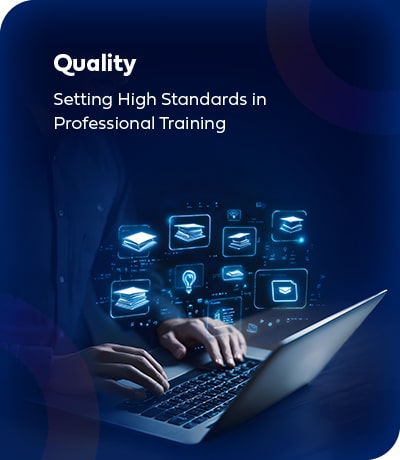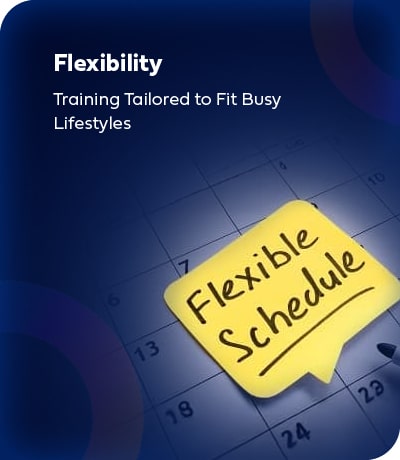
4.8 out of 5 based on 14,693 reviews

Online Course with Exam
Start learning immediately
1,573 Students enrolled
Price Match
Guarantee

3 months instalments of: £458.33
6 months instalments of: £229.17
9 months instalments of: £152.78
12 months instalments of: £114.58

By submitting this form, you agree to e-Careers processing your data in line with our Privacy Policy
Do you want to start your career as a full-fledged certified bookkeeper in the bookkeeping and accounting industry? Our ICB Level 2 and 3 Bookkeeping training package is perfect for aspiring bookkeepers who can fully commit to learning the fundamentals and advanced bookkeeping skills.
This course is suitable for all, with no formal entry requirements, so if you want to master in-demand bookkeeping skills, this ICB online course is for you!
Our course package trains you with core bookkeeping knowledge and supports you step-by-step on your bookkeeping journey from start to finish. Completing this training package will demonstrate your mastery of bookkeeping practices and increase your professional recognition with employers, businesses, and clients.
ICB Level 2 Certificate in Bookkeeping and ICB Level 3 Certificate in Bookkeeping and Accounts are accredited qualifications regulated by one of the most prominent institutes for bookkeepers, The Institute for Certified Bookkeepers (ICB). Earning your ICB Level 2 and 3 qualifications will give you the opportunity to apply for Associate membership and full ICB membership status and use the designatory letters AICB and MICB in your bookkeeping profession.
With an ICB Level 2 qualification, you can apply for job opportunities such as Assistant Bookkeeper, Accounts Assistant, Data Entry Clerk, Accounts Payable and Receivable Clerk, and Junior Bookkeeper. If you successfully earn the ICB Level 3 qualification, you can apply for job opportunities such as Bookkeeper, Accounts Payable Lead, Credit Controller, and Payroll Administrator.
Our online ICB Level 2 and 3 Bookkeeping training package offers you the following:
Access to industry-leading eLearning platform.
ICB-approved training course materials.
Support from award-winning, industry-expert Tutors.
Free Sage Software and Xero Accounting Software
Sage Certificate
Mock exam papers
ICB exams included in the course fee
Interactive course content.
Interest-free payment options.
Best price guaranteed on like-for-like ICB courses.
We trained over 630,000 students.
The syllabus for both courses centres around the assessments you must take before receiving your ICB qualifications. Each assessment will test your bookkeeping knowledge and skills based on each course's key topics.
For the ICB Level 2 Certificate in Bookkeeping, the key topics involved are:
Underpinning knowledge
Prepare business documents
Accounting for VAT
Entering transactions
Reconciliation and reporting
Meanwhile, for the ICB Level 3 Certificate in Bookkeeping and Accounts, the six key topics covered are:
Underpinning knowledge
Reconcile accounts and correct errors
Reconcile and produce a VAT return
Calculate and post adjustments to the accounts
Produce draft final accounts for internal management purposes
Interpretation of financial statements
On average, our students can complete the Level 2 ICB course within 6 to 12 months and the Level 3 ICB course in the same timeframe. We provide 12 months of access for each course so you can study the qualification at your own pace.
Format
The ICB Level 2 Certificate consists of three online assessments: A1, A2, and A3. The exams should be taken in numerical order, starting at A3.
The ICB Level 3 Certificate course consists of four online assessments, M4, M5, M6, and M7, and an M8 exam through remote invigilated examination. All these ICB examinations should be taken in numerical order, starting at M4. We'll provide you with the materials and resources needed to help prepare for all your exams in both courses. (See Additional Benefits tab)
If you complete all three assessments in the Level 2 ICB Certificate in Bookkeeping, you'll receive the relevant certification and can now upgrade your member status to ICB's associate membership. You'll then receive the designatory letters, AICB, that you can use for your bookkeeping profession.
Subsequently, if you complete all five assessments in the Level 3 ICB Certificate in Bookkeeping and Accounts, you'll receive the relevant certification and can now upgrade your member status to ICB full membership. You'll then receive the designatory letters, MICB, and use it in your bookkeeping profession.
A1 – Basic double-entry bookkeeping to trial balance
A1 covers and assesses aspiring bookkeepers with the fundamental concepts of double-entry bookkeeping. You'll learn to enter transactions in sales and purchases ledgers, input journal entries, and create a trial balance. Some of the basic principles involved are:
Underpinning knowledge including:
Knowledge of the legal differences between the business types that exist
Terms in bookkeeping (assets, liabilities, etc.)
Banking procedures and security
Understanding the different categories of VAT (standard, reduced, zero, exempt, outside the scope)
Understanding the format of the accounting equation
Understanding the different categories of discounts (trade, bulk, prompt payment, etc.)
Understand the difference between financial and management accounts
Understand the concept of reporting on a cash basis for income tax purposes
Calculation of the value of the capital investment for a sole trader
Performing opening entries in the journal
Creation of business documents, including how to calculate and correctly account for VAT
Understanding the effect of entering transactions into a bookkeeping system for sales, purchases, overheads, capital items, returns, personal items, etc.
Recording the effect of making and receiving payments, including bank, cash and petty cash transactions
Calculation of relevant account balances
Production and explanation of a trial balance
A2 – Further double-entry bookkeeping to trial balance
A2 assesses your understanding of the advanced concepts in double-entry bookkeeping, recording financial transactions and preparing a trial balance. The key concepts that A2 will assess you are:
Underpinning knowledge including:
Professional Ethics
Legislation relevant to the bookkeeper
Accounting concepts
Further double entry includes the following:
Topics from A1 papers
The content of control accounts
Understanding and posting discounts allowed/received
Writing off a bad debt
Construction Industry Scheme (CIS)
Posting non-sole trader entries (subscriptions, donations, drawings of partners, directors' loan accounts, etc.)
Performing journal entries (payroll journal calculation, bad debt expense, etc.)
Calculation of the value of a suspense account in a system that does not balance
Reconciliation of debtors, creditors and bank balances
Understanding the treatment of imports and exports
Correction of errors that do not affect the trial balance
Production and explanation of a trial balance
A3 – Data entry to trial balance using software
A3 assesses your bookkeeping knowledge and skills in accounting software that you would need in today's modern bookkeeping world. The assessment will test how you efficiently record transactions and generate trial balances using accounting software programmes. Some of the key concepts you'll learn to apply in accounting software are:
Opening of entries
Entry of cash and credit transactions
Production of a trial balance
Production of reports for debtors, creditors, banks, VAT and the audit trail
Bank reconciliations
Correction of errors
M4 – Reconciliations and Final Accounts of a Sole Trader
M4 assesses your knowledge and skills in reconciling the final accounts for a sole trader business. Some of the key concepts M4 will assess you are:
Underpinning knowledge
Reconciliation and correction of errors (customer and supplier reconciliations, bank reconciliation, correction of errors including the clearance of a suspense account balance)
The calculation of summary figures for control accounts
VAT Returns (cash and standard VAT Returns only but including EU transactions)
Posting adjustments, including disposal and acquisition of fixed assets
Revaluation of assets
Final accounts of a sole trader (profit and loss account and balance sheet)
M5 – Final Accounts of a Partnership
M5 assesses your knowledge and skills in reconciling the final accounts for a partnership business. Some of the key concepts M4 will assess you are:
All topics from M4 but set in a partnership scenario
Underpinning knowledge
Ethical obligations and considerations
Legal requirements for a partnership
Final accounts of a partnership, including the appropriation account and production of partners’ current accounts
Calculations and bookkeeping entries to record a change of partnership (partnership ratios, goodwill, the effect on capital and current accounts, etc.)
M6 – Final Accounts for a Not-for-Profit Organisation
M6 assesses your knowledge and skills in reconciling the final accounts for a not-for-profit organisation. Some of the key concepts M4 will assess you are:
All of the requirements of paper M4 but set in a not-for-profit scenario
Underpinning knowledge regarding not-for-profit organisations
Understanding the different requirements of a chart of accounts for such an organisation
Understand the concepts of the different forms of income for not-for-profit organisations, including a subscription account.
Posting adjustments, including the subscriptions account and disposal and acquisition of fixed assets
Final accounts of a not-for-profit organisation
M7 – Final Accounts for Incorporated Businesses
M7 assesses your knowledge and skills in reconciling the final accounts for a not-for-profit organisation. Some of the key concepts M4 will assess you are:
Final accounts, including adjustments for a limited company (internal management accounts format only)
Limited liability partnerships
Calculation and interpretation of ratios
M8 - Level 3 Certificate in Bookkeeping and Accounts Synoptic Exam
M8 is the invigilated synoptic exam designed to test your comprehensive understanding of the entire Level 3 curriculum. It typically includes a mix of question formats, such as multi-choice and data entry.
Duration
Once you've started an exam, you must complete it within the exam duration. Remember to complete and submit your exam within 14 days of booking to avoid the assessment becoming void. Here are the duration for each exam at this level:
A1 – Basic double-entry bookkeeping to trial balance: 2 hours
A2 – Further double-entry bookkeeping to trial balance: 2 hours
A3 – Data entry to trial balance using software: 24 hours
M4 – Reconciliations and Final Accounts of a Sole Trader: 3 hours
M5 – Final Accounts of a Partnership: 3 hours
M6 – Final Accounts for a Not-for-Profit Organisation: 3 hours
M7 – Final Accounts for Incorporated Businesses: 3 hours
M8 - Level 3 Certificate in Bookkeeping and Accounts Synoptic Exam: 2 hours
Availability
All eight assessments are available on-demand, so you can book an exam once you've completed all the course materials for a particular assessment. We'll assist you with the process and additional instructions for booking and registering for an exam.
You'll need an active student registration or membership to take your exams online. While we provide the exams in the course, annual student registration is separate from the course price.
If you want to change careers or become an employed bookkeeper, this course package is for you. Our ICB Level 2 and 3 course is the perfect package for anyone who wants to complete all of ICB's core qualifications in bookkeeping.
You can enrol in our ICB Level 2 and 3 Certificate in Bookkeeping and Accounts course package even if you have little to no experience in bookkeeping or finance. This course package has no formal entry requirements and is beginner-friendly since you'll start in the ICB Level 2 Certificate in Bookkeeping.
To study the ICB Level 2 and 3 Certificate in Bookkeeping and Accounts course, we recommend that you:
Are at least 16 years old (or have the consent of a parent or guardian).
Have a solid understanding of the English language.
Have basic numerical skills.
Have access to a PC or laptop (This course is both Mac and Windows compatible).
Have access to a secure internet connection.
Most comprehensive course training at the most affordable price.
ICB certification: Earn a bookkeeping qualification awarded by the leading institute for certified bookkeepers.
Comprehensive eLearning platform: Access an industry-leading eLearning platform that contains all the support and learning materials you need and has a user-friendly interface for easy navigation.
Responsive tutor support: Request unlimited tutor support from award-winning training providers and industry experts who aim to assist you with your learning and respond to you within 24-48 hours.
Interactive course content: Our interactive course content, consisting of engaging slides, videos, animations, and more, can help you engage with the lessons better
Fully accredited ICB courseware: Gain additional learning insights as we provide ICB-accredited learning resources, including pocket revision kits, practice papers, question banks, and exam preparation guides.
Flexible learning: Study at your own pace, as you'll have 12 months of access to each course in our eLearning platform.
Free Accounting Software: Learn computerised bookkeeping practices as we provide you with free accounting software such as Sage and Xero Accounting during your study of our course.
Sage Certificate included: Enhance your professional credibility and earn your Sage certification as an addition to your professional toolkit.
Mock exam papers: Our mock exam papers help you simulate and get a feel for the actual examinations, helping you prepare for your ICB exams.
Interest-free payment options: Our interest-free payment options make your education more accessible, so you can start this distance learning course package and start your learning journey without worries.
TOTUM Pro Card: Shop with discounts using TOTUM Pro Card, which offers discounts in selected stores and websites.
Is ICB a good qualification?
Yes, ICB qualifications are recognised all over the world. The Institute of Certified Bookkeepers is one of the most prominent awarding bodies for the bookkeeping profession, having students and ICB members across 100 countries. ICB has an outstanding reputation and is trusted by employers, businesses, and organisations worldwide.
How do I get ICB certified?
To get ICB Certified, you must choose the relevant qualifications you want to study and register as an ICB student. Complete the course materials and take the corresponding exams in the specified order. Upon completion, you can upgrade to full membership level in the ICB and become a certified bookkeeper.
What is ICB Level 2?
The ICB Level 2 Certificate in Bookkeeping is an introductory qualification offered by the Institute of Certified Bookkeepers, the world's largest bookkeeping institute. It equips individuals with the basic principles and practical skills to perform basic bookkeeping tasks. In this course, you will accurately prepare business documents, enter transactions, correct errors, prepare an initial trial balance, and more.
What is ICB Level 3?
The ICB Level 3 Certificate in Bookkeeping and Accounts is one of the ICB bookkeeping courses and the vertical progression from ICB Level 2. This bookkeeping course equips you with the advanced skills and knowledge needed to tackle more complex bookkeeping tasks. In this course, you will precisely complete an initial trial balance, reconcile transactions, correct entries, post adjustments, prepare final accounts, and more.
How long does it take to complete this ICB course?
At e-Careers, we offer flexibility in the course to allow our students to study at their own pace. On average, our students can complete the Level 2 ICB course within 6 to 12 months and the Level 3 ICB course within the same timeframe.
What should I do next after I have completed the ICB Level 3 Certificate?
Upon completing the Level 3 ICB Certificate, you can upgrade your associate member status to ICB full membership. You'll receive the designatory letters, MICB, and use them in your bookkeeping profession.
Alternatively, you can also pursue an accounting qualification to gain professional recognition in accounting and potentially specialise in areas like financial accounting, tax accounting, or auditing.
What jobs can I apply for after my ICB course training?
Accounting Clerk
Accounting Clerks work for large companies, handling prime entry books and maintaining records for a single account. Their average salary in the UK is £23,000.
Accounts Administrator
An Accounts Administrator handles data-entry tasks such as processing invoices, managing financial records, and supporting the finance team with day-to-day accounting duties. The average salary for this role is around £23,000.
Sales and Purchases Ledger Clerk
A Sales and Purchases Ledger Clerk records financial transactions, processes payments, and manages payable and receivable accounts. The yearly salary for this position is £23,000.
Accounts Payable Clerk
An accounts payable clerk is an essential part of a company's financial team. They are responsible for managing the money the company owes to its vendors and suppliers. Their annual salary in the UK is £24,000.
Bookkeeper
Bookkeepers record daily business transactions and maintain the accuracy and completeness of the company's financial records and multiple accounts. The average salary of bookkeepers in the UK is £27,000.
Accounts Assistant
As an Accounts Assistant, you'll support accounting teams with tasks like preparing accounts, processing invoices, and handling balance sheets. The yearly salary of accounts assistants is £27,000.
Tax Assistant
A Tax Assistant is responsible for preparing tax returns, managing tax records, and assisting with tax compliance. Tax assistants earn about £29,000.
Payable and Expenses Supervisor
The Payable and Expenses Supervisor oversees accounts payable processes and ensures accurate and timely payments. This role has a salary of £30,000.







